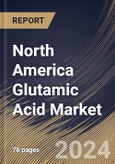The clean label movement, characterized by a demand for transparency and natural ingredients, has influenced the market. Consumers increasingly scrutinize product labels, seeking formulations that align with clean label principles. In response, manufacturers are exploring clean-label alternatives and natural sources of umami to cater to consumer preferences. This trend has led to the development of glutamic acid-free or reduced formulations and the use of naturally occurring its sources like tomatoes and seaweed.
As a key contributor to umami, it is at the forefront of culinary innovations. Chefs and food scientists are experimenting with umami-rich ingredients to create fusion cuisines that transcend cultural boundaries. This trend is reflected in the development of new products, restaurant offerings, and culinary experiences that celebrate its savory and complex taste. Beyond its traditional role as a flavor enhancer, it is finding applications in functional foods. The integration of these acids into products designed to offer health benefits is gaining traction. This includes incorporating the acid in formulations promoting gut health, cognitive function, and overall well-being. As consumer awareness of the connection between nutrition and health grows, functional foods containing this acid are positioned for increased market adoption.
Numerous variables can impact the demand for cosmetics in Canada, such as shifting consumer preferences, industry developments, and trends. The United States has a culturally diverse population with various culinary preferences. It is an ingredient widely utilized in various cuisines, including Asian, American, and European, due to its reputation for augmenting savory flavors. As per the data provided by the report named Advance Monthly Sales for Retail and Food Services, September 2023, released by the U.S Census Bureau, preliminary estimates placed retail and culinary services sales in the United States at $704.9 billion. Comparing the July 2023 to September 2023 period to the corresponding period of the previous year revealed a 3.1 percent (±0.4 percent) increase in total sales. Therefore, North America's rising cosmetics and food industries will help expand the regional market.
The US market dominated the North America Glutamic Acid Market, By Country in 2022, and would continue to be a dominant market till 2030; thereby, achieving a market value of $3,327.8 million by 2030. The Canada market is experiencing a CAGR of 6.8% during (2023 - 2030). Additionally, The Mexico market would exhibit a CAGR of 5.9% during (2023 - 2030).
Based on End-use, the market is segmented into Food Industry, Pharmaceutical, Cosmetic & Personal Care, and Others. Based on countries, the market is segmented into U.S., Mexico, Canada, and Rest of North America.
List of Key Companies Profiled
- Ajinomoto Co., Inc.
- Evonik Industries AG (RAG-Stiftung)
- Wuhan Amino Acid Bio-Chemical Co., Ltd
- Sichuan Tongsheng Amino acid Co., Ltd
- Medinex
- KYOWA HAKKO BIO CO.,LTD. (Kirin Holdings Company, Limited)
- Hefei TNJ Chemical Industry Co.,Ltd.
- Haihang Industry Co.,Ltd.
- FUFENG GROUP
- AMINO GmbH
Market Report Segmentation
By End-use (Volume, Kilo Tonnes, USD Billion, 2019-2030)- Food Industry
- Pharmaceutical
- Cosmetic & Personal Care
- Others
- US
- Canada
- Mexico
- Rest of North America
Table of Contents
Companies Mentioned
- Ajinomoto Co., Inc.
- Evonik Industries AG (RAG-Stiftung)
- Wuhan Amino Acid Bio-Chemical Co., Ltd
- Sichuan Tongsheng Amino acid Co., Ltd
- Medinex
- KYOWA HAKKO BIO CO.,LTD. (Kirin Holdings Company, Limited)
- Hefei TNJ Chemical Industry Co.,Ltd.
- Haihang Industry Co.,Ltd.
- FUFENG GROUP
- AMINO GmbH








